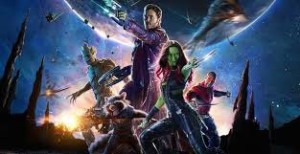 Not many people know the origin story behind “Guardians of the Galaxy,” the Marvel Comics superhero film that took the box office by storm when it opened last summer and has grossed an estimated $775 million to date.
Not many people know the origin story behind “Guardians of the Galaxy,” the Marvel Comics superhero film that took the box office by storm when it opened last summer and has grossed an estimated $775 million to date.
In addition to its staggering success and its cementing of Chris Pratt as a leading man, “Guardians” is being recognized for its writing, being honored with nominations from the Final Draft Awards and the Writers Guild of America for best adapted screenplay. It was written by Nicole Perlman and James Gunn, who also directed the feature.
So here’s how it all began. Perlman, a science fiction and space aficionado who had written unproduced screenplays, was tapped in 2009 to be part of the Marvel Writers Program. She was among five others who were each given an office on the lot and a choice of projects to work on full-time for two years, while not knowing if the projects would ever get made, as they were C and D-level lower priorities for the studio at the time.
Perlman chose “Guardians” off the list the writers were given, because it was mostly science fiction–and she had other reasons as well. “It was fun, there was not a lot of canon involved and there was a different group of characters that were newer to the scene,” she says. “I liked that it was not traditional, but fun and pop-y. It felt very experimental. Marvel didn’t have as jam-packed of a slate then as it does now.”
She worked on developing characters that originated in the comic books, often adding new material to their back-stories to make them more relatable to movie audiences, specifically in the case of lead character Peter Quill.
Some characters had to be left on the cutting room floor, others were leased out to other projects and couldn’t be used, like anything that smacked of “Fantastic Four” or “X-Men.” Rocket Racoon, eventually played by Bradley Cooper, became one of her favorites.
“The biggest thing I’m proud of is rebooting Peter’s character,” Perlman says. “He’s very classic and honorable but a sarcastic and lovable hero. In the comic books, he wasn’t a smuggler and didn’t have a mother back story. Those were parts I gave him to make sure he was relatable – his strong childhood on Earth and his shared childhood interests with the audience weren’t in the comics. Part of the benefit of the Marvel program was that I could experiment and take a lot of risks, which help create a more unusual tone.”
After the two-year writers program ended, Perlman was brought back by the studio to work further on the script and Gunn was also brought into the process.
The entire time it was being developed, “Guardians” was going against the trend of dark and edgy comic book movie scripts like “The Dark Knight.” Perlman had no idea it would ever get made–until she went to the premiere of “The Avengers” and saw an allusion to it at the very end, which she calls an amazing moment.
Although the script was not written with certain actors in mind for the parts, Perlman said she was especially thrilled with the casting of Pratt and of Zoe Saldana as Gamora.
“Marvel’s so great about casting,” she says “They have an open-minded and brave view about it and the choices here were so perfect.”
The entire process was a great learning experience for Perlman, who has other projects in the works, including a screenplay about the renowned scientist Richard Feynman who had started off working on the Manhattan Project and went on to become a whistleblower in the investigation into the space shuttle Challenger disaster.
Yet months after its release, she still– okay, we have to say it – marvels at how “Guradians” went down, bucking trends on many levels.
“There’s no way I could’ve made it dark and edgy,” she says. “It wouldn’t have been true to the story. I learned not to write for what’s hot or hip right now. Look at ‘The Lego Movie.’ Now people are suddenly excited, and it shows what can be done.”
–Hillary Atkin


